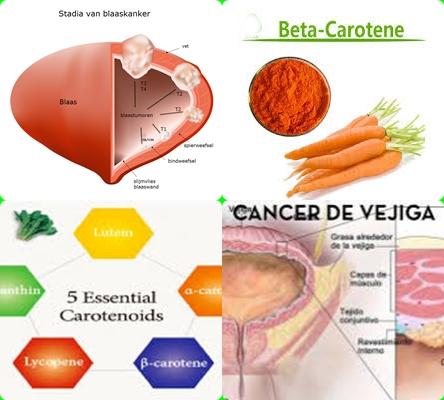
Objectives:
Some evidence indicates that carotenoids may reduce the risk of bladder cancer (BC), but the association is unclear. Therefore, this review article has been conducted.
Do carotenoids (β-cryptoxanthin, α-carotene, β-carotene and lutein and zeaxanthin) reduce risk of bladder cancer?
Study design:
This review article included a total of 22 studies (case-control and cohort studies) involving 516,740 adults.
Results and conclusions:
The investigators found for the highest compared with the lowest category of carotenoid dietary intake a non-significantly reduced risk of 12% [RR = 0.88, 95% CI = 0.76 to 1.03] for bladder cancer.
Non-significantly because RR of 1 was found in the 95% CI of 0.76 to 1.03. RR of 1 means no risk/association.
The investigators found for the highest compared with the lowest category of circulating carotenoid concentrations a non-significantly reduced risk of 64% [RR = 0.36, 95% CI = 0.12 to 1.07] for bladder cancer.
The investigators found for the highest compared with the lowest category of circulating lutein and zeaxanthin concentrations a significantly reduced risk of 47% [RR = 0.53, 95% CI = 0.33 to 0.84] for bladder cancer.
Significantly because RR of 1 was not found in the 95% CI of 0.33 to 0.84. RR of 1 means no risk/association.
The investigators found dose-response analysis showed that bladder cancer risk significantly decreased by 42% [RR = 0.58, 95% CI = 0.36 to 0.94] for every 1 mg increase in daily dietary β-cryptoxanthin intake.
The investigators found dose-response analysis showed that bladder cancer risk significantly decreased by 76% [RR = 0.24, 95% CI = 0.08 to 0.67] for every 1 μmol/L increase in circulating concentration of α-carotene.
The investigators found dose-response analysis showed that bladder cancer risk significantly decreased by 27% [RR = 0.73, 95% CI = 0.57 to 0.94] for every 1 μmol/L increase in circulating concentration of β-carotene.
The investigators found dose-response analysis showed that bladder cancer risk significantly decreased by 56% [RR = 0.44, 95% CI = 0.28 to 0.67] for every 1 μmol/L increase in circulating concentrations of lutein and zeaxanthin.
The investigators concluded dietary β-cryptoxanthin intake and circulating concentrations of α-carotene, β-carotene and lutein and zeaxanthin reduce risk of bladder cancer.
Original title:
Carotenoid Intake and Circulating Carotenoids Are Inversely Associated with the Risk of Bladder Cancer: A Dose-Response Meta-analysis by Wu S, Liu Y, […], Ramirez AG.
Link:
https://www.ncbi.nlm.nih.gov/pubmed/31800007
Additional information of El Mondo:
Find more information/studies on carotenoid consumption and cancer right here.